Peter MALONE
Saturday, 09 October 2021 13:03
Jez: A Letter to Life
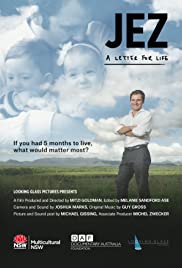
JEZ: A LETTER TO LIFE
Australia, 2021, 52 minutes, Colour.
Directed by Mitzi Goldman.
This is a portrait of a significant member of the Sydney Jewish community, Jeremy Spinak. It is also something of a eulogy.
Jeremy Spinak was diagnosed with a rare form of cancer in the heart, no cure known. He decides that he would like to leave a testimony to his twins, born just as he received his diagnosis. He speaks to camera about his life, his childhood, energetic in sports-loving as a teenager, his marriage, his brother and parents and extended family, his happiness.
Jeremy is also a public figure in the Jewish community, especially on the board of the Jewish Board of Deputies, and becoming its youngest president. Scenes are shown of him receiving a public award, presented by the Premier of New South Wales, Gladys Berijiklian.
The film goes into his background and his years of work, political advice, social causes, a focus on equality and elimination of prejudice. There are various testimonies from public figures as well as friends.
There is great appreciation from his older brother, Michael.
What enhances the eulogy is that there is a great deal of film footage, home movies of the past, quite an amount to give a visual impression of the young Jeremy, his growing up, his early years, being with his family, his public life.
The subject is worthy, the treatment indicating how this particular mode of filming can be a valuable record of a person’s life.
The film was directed by Mitzi Goldman, who has built up a significant reputation as producer of fine documentaries..
Published in Movie Reviews
Published in
Movie Reviews
Saturday, 09 October 2021 13:03
When Hitler Stole Pink Rabbit
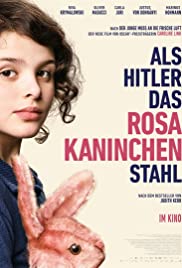
WHEN HITLER STOLE PINK RABBIT/ ALS HITLER DAS ROS KANINCHEN STAHL
Germany, 2020, 119 minutes, Colour.
Riva Krymalowski, Marinus Hohmann, Carla Juri, Oliver Masucci, Justus von Dhonanyi, Ursula Werner.
Directed Caroline Link.
The novel by Judith Kerr, British media and writing celebrity (longtime married to Nigel Neill, creator of the Quarter mass stories) was very popular, translated into 20 languages, the German television film produced in 1978.
Now, this film directed by Caroline link (Dir of the Oscar-winning Best Foreign Language Film of 2003, Nowhere in Africa), takes audiences back to Germany of almost 90 years ago. It is 1933, February, 10 days before the elections and the possible assumption of leadership by Adolf Hitler (and his forming a coalition to become chancellor).
This is a Jewish story, the story of our family, comfortable in Berlin, parents, son and daughter, housekeeper, whose life is suddenly transformed, their having to leave Berlin instantly, becoming Jewish refugees, in Switzerland, in Paris, and, with the final image of the film, on the ferry looking at the white cliffs of Dover where England is to be their home.
The story is seen through the eyes of the two children but, especially, through the eyes of nine year old Anna who turns 10 while in Switzerland. She is played by Swiss young actress, Riva Lrymalowski (who would seem to have a successful career ahead of her), Anna, with Marina’s home and has Max, three years older than Anna. They are at school, with friends, comforts at home, almost spoilt, a loving housekeeper, a father who dotes on his children, a loving mother. The father has the flu – and a sudden phone call means that he has to flee immediately to Prague, then to Switzerland, and then almost immediately, the rest of the family having to escape from Berlin, a train ride, the German passport control thinking the name familiar, but a contrasting welcoming from the Swiss passport control.
In fact, the father, Arthur, is a celebrated theatre critic in Berlin, definite in his opinions, but also an even fierce a critic of Nazism. Dorothea, his wife, is a pianist. The first half hour of the film shows the family in Berlin, life and atmosphere of that February 1933. The second half hour of the film has the family in Switzerland, out in the beautiful countryside, the Alps, welcomed by a family at an inn, the children going to school, making friends, Arthur trying to earn money by writing articles but the Swiss apprehensive, wanting to maintain and neutrality with Germany.
The last hour of the film takes place in Paris where the family again take refuge, living upstairs in a dingy apartment, a cranky landlady who becomes more and more locally anti-Semitic, managing on a small salary that Arthur will receive by being a theatre critic and Paris for a Jewish paper. The emphasis is on how difficult it is for young children to try to understand, to live with changes to their comfortable lives, to managing while being poor, to adapt in language to new schools, to realise that they are Jewish refugees and may have to continue to be so.
Arthur tries to do his best for his family, sometimes sporting them, the cake for his wife, some as cargo for his only son, Christmas trees, president of Scott present school bags… But, the children are adaptable, do particularly well at school, and having to learn all the dates of Napoleon’s victories – which leads to Arthur writing a screenplay about Napoleon, submitting it to accompany in England, opening up a possible future. It is 1934.
The style of the film is classic film storytelling, straightforward, some touches of the epic, other touches of the domestic, with some contemporary audiences looking for more stylistic flair and experimentation dissatisfied. But, for most audiences who appreciate this, albeit old-fashioned, classic style, will find this a moving story.
1. The title? International popularity? The novel and the adaptation?
2. 1933 – 1934, Berlin, homes, school, the streets, neighbourhoods? Switzerland, the beauty of the Alps, the town, homes, school, countryside? Paris, the city, familiar views, apartments, restaurants, business? The glimpse of the white cliffs? The musical score?
3. The title, the tone, the focus on Hitler, the rise of the Nazis, the 1933 elections, persecution of the Jews, confiscation of passports, concentration camps, Jewish refugees?
4. The portrait of the family, the father and his role as a critic, outspoken against the Nazis? Under threat? The mother, aunts, pianist? Max, his age, school, personality? Anna, her age, school, precocious, yet childlike, her toys – and the dilemma between taking the dog and the pink rabbit?
5. The maid and housekeeper, the bond with the family, with the children, the later phone calls, their happy memories?
6. The situation in Berlin, Arthur and the flu, the phone call, his escape suddenly to Prague, the move to Switzerland? The need for the family to move? The visit from Uncle Julius and his warnings? Packing, unable to tell friends, the neighbour watching, the train to Switzerland, the German authorities and questioning the name, the welcoming Swiss authorities? The hotel, expense, Anna’s’ collapse in the flu?
7. The Swiss setting and the village, the kindly family taking them in, Arthur and his trying to write, the Swiss wary about having his criticisms, wanting neutrality, the trip on the lake, his speech? Dorothea, adapting to life in Switzerland, giving up possessions, the piano? Max, with the boys, school, adapting? Anna, sadness, her page with the crosses hoping for return home, the girls at school, the cartwheels and the criticism, the boys throwing stones, symbol of love? The change of pace? The language and Swiss German? The food, the melted cheese…?
8. Anna, her 10th birthday, the celebration, on the lake, the realisation that they would have to move?
9. Arthur and Dorothea going to Paris, the children upset, their father returning, the farewell, arriving in Paris, the apartment, the touch of the dingy, the fascist neighbour and her criticisms, the landlady and her demands, the rent, emerging anti-Semitism, her outbursts?
10. The family surviving in France, Max and his going to school, the Christmas gift of the school bags, Max and his adapting, language, success and topping the class? Anna, at home, her drawings of disasters, her drawing of the booklet with the Eiffel Tower and its movement, beginning to learn French, the public school, the girls, the uniform, the teacher, the dictation and errors, adapting, writing the story of her father, winning the prize, the money? Retrieving the corns from the monument pool?
11. Arthur and the encounter with the theatre director, the friendly gesture, Arthur and his arrogant condemnation of the director? The director’s wife, the phone call, Dorothea and the children going to visit, the food, the company, and Dorothea and the piano duet? Arthur severe reaction? Dorothea standing her ground?
12. Arthur and the newspaper, the invitation to be the theatre critic, the limited payment? The family poor, unable to afford things? Arthur spoiling Dorothea with the cake? The hungry Max with the snails? Christmas tree, the Christmas gifts? Celebrating Christmas as a German feast?
13. The film tracing the pressures on the family, on Arthur, his past reputation, the responsibility of supporting his family, Dorothea and her support, adapting to poverty, learning to cook, badly…? The children, the childhood response to the difficulties?
14. Uncle Julius, the Jewish grandmother, work at the zoo, the bond with his family, the visits, his being sacked, his death in the news? The gift of the animals, the elephants?
15. The classes on Napoleon, Anna memorising the dates, the comments, Arthur deciding to write the screenplay, acceptance in England?
16. Leaving the apartment, the landlady at her outburst? On the ferry, the site of the white cliffs?,
17. The story from the perspective of the children, from Anna’s perspective, aged 10?
18. The consequent information about Judith Kerr, settling in England, her writings?
Published in Movie Reviews
Published in
Movie Reviews
Saturday, 09 October 2021 13:03
Holy Silence
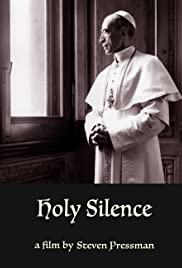
HOLY SILENCE
US, 2019, 72 minutes, Colour/black and white.
Directed by Steven Pressman.
This significant documentary reminds us how much can be contained in a film of 70 minutes, so many challenging words, so many even more challenging images.
The holy silence of the title is that of, especially, Pope Pius XII concerning the Jews, persecution, concentration camps and the Holocaust, local Roman issues, in the early 1940s. The question is raised: had Pius XII spoken more specifically and with more vigour about the Jews, as well as the challenge to Hitler and Nazi supremacy, would Hitler have taken notice, would matters have been different?
It needs to be said that this is an American documentary, very strongly American in its point of view. The director has made a number of documentaries on Jewish issues. And the range of talking heads, very articulate talkers, mainly historians, men and women, who have written books about the war, the papacy during the war. Although the focus is on Europe, there is also an emphasis on President Roosevelt, his contact with the Vatican, a visit of Cardinal Pacelli, as Secretary of State to Pius XI, to the United States, the President and letters, appointments of special representatives to negotiate with the Vatican, living in Italy, requests for negotiations about war and what the Pope should say.
It also needs to be said that there is an important omission from the film. The focus on Pope Pius XI’s very strong, in praise of him. However, there is no reference to his 1937 encyclical, Mit Brennender Sorge/ With Burning Concern, written in German, with consultation of German bishops, a denunciation of Hitler and the Nazis. Rather, the screenplay focuses on an intended encyclical on racialism.
There is a particular American connection with this intended encyclical, a focus on a Jesuit, John Lafarge, working with African-American? communities, his writings on these justice themes, coming to the notice of Pius XI and the request for him to do a draft for the encyclical. The draft was delayed by the superior general of the Jesuits, coming to the notice of the Pope almost too late, Pius XI dying in February 1939, Pius XII not following through on Lafarge’s work.
Attention is given to Pius XI in the 1920s and 1930s, his dealing with Mussolini and the Italian fascists, the concordat of 1929 establishing Vatican city, his critique of the Nazi regime. And, his Secretary of State was Cardinal Eugenio Pacelli, former papal Nuncio to Germany.
But, most attention is given to Pope Pius XII and his stances on the war, Nazism, the Jews and the Holocaust. Pius XII, with his diplomatic background, opted for diplomacy in dealing with Hitler and the Nazis. One commentator notes that Pius XII expected Hitler to win the war and saw the Pope’s role as a significant negotiator for peace. Which highlights the Pope’s stance on neutrality. The Pope also wanted to save Rome from bombing, to save the church and its cultural heritage.
The film has some criticism of the Pope’s not intervening to help and save the Jews in Rome and their being rounded up – although the film highlights how convents opened up and took in refugees.
There are many sequences highlighting the dignity and status of the Vatican, of the Catholic Church with its ritual, a great deal of Vatican pomp, a highly clerical presence. It is interesting to note that with the many, many pictures of Pius XII, he is seen smiling only after the Americans enter Rome.
The film notes the promulgation of Vatican II’s Nostra Aetate in 1965 on relations between Catholics and Jews.
The significant framework of the film focuses on Pope Francis, words of seeking the truth at the opening, images of Francis walking at Auschwitz at the end.
1. The title? The church? Pius XII? An assessment? Blame?
2. An American film, interpretation, focus? The director? The range of experts and talking heads? The focus on the Jesuit, John Lafarge?
3. The important omission of Pius XI’s encyclical, Mit Brennender Sorge/ With Burning Concern, an encyclical, written in German, with German bishops, promulgated 1937? The critique of the Nazis? Why not referred to in this film?
4. The structure of the film: the opening quotations for Pope Francis about seeking the truth, the narrative of the 1920s, 1930s, during World War II, but Francis walking in Auschwitz?
5. The range of talking heads, men and women, academics, the law? Clergy? The German historian? The range of references, the books on the era, the American authors?
6. The focus on Pius XI, on Pius XII, the Vatican in the 1920s, Mussolini, fascism, the concordat of 1929, the 1930s and the Nazis, the 1940s and the war, the visuals of the Vatican, black-and-white archives, on each of the popes, the Vatican pomp, vestments, rituals, attendant clergy…?
7. Pius XI, the background of Mussolini, the rise of the fascists, not anti-Semitic, Jewish fascists? The concordat of 1929? Vatican state? Eugene Pacelli as his Nuncio in Germany? The 1930s, Pius XI and social concern, the encyclical of 1937, his plan to write another encyclical, on racism and racialism, his interest in the works of John Lafarge, his booklets on social justice, inviting him to the Vatican, commissioning him to write the draft of the encyclical, his not receiving it, his illness, his death? Completely untimely?
8. The focus on Cardinal Pacelli, in the 1930s, in Germany, learning German, familiar with German culture, his moving to be Secetary of State, his emphasis on diplomacy, its being a priority, his quashing of the Lafarge draft?
9. Pius XII and the experience of war, the emphasis on diplomacy, the consequences, the Pope assuming that the Nazis would win, seeing himself having a role at the end of the war as a negotiator for peace? The consequences of his diplomacy? The impact on the Jews, persecution, concentration camps, the hunt in Rome?
10. The United States, result, the contacts, Pacelli’s visit to the United States? The letters, the voice-over of Roosevelt? Roosevelt scenting his diplomats, their presence during the war, the discussions with Pius XII?
11. The information about father Charles Coughlin, Detroit, his radio broadcasts, supporting Roosevelt, feeling betrayed, attacking Roosevelt, becoming more and more anti-Semitic, supported by his Cardinal, yet the closing-down of his broadcasts by 1940?
12. The Jews in Rome, not being warned of the attack, the convents and opening up, the interview with the nun and her reminiscences about the situation, the assumption that the Pope approved? The imprisonment of the Jews and the prison camp near the Vatican? Pius XII and his wanting to save Rome, Catholic culture?
13. The young Italian Jewish woman in the present and her severe criticisms?
14. The question concerning Pius XII, if he had been more explicit in naming the Jews, in defying the Nazis? Would Hitler have taken any notice?
15. Pius XII, joy at the end, only then seeing him smile? His speeches, welcoming the troops?
16. The information about Vatican two, Nostra Aetate and the relationship between Catholics and Jews?
17. A documentary of 70 minutes, the experience of watching it, the issues raised, discussions in words, the impact of the images, the challenge?
Published in Movie Reviews
Published in
Movie Reviews
Saturday, 09 October 2021 13:03
Billionaire Boys Club, The
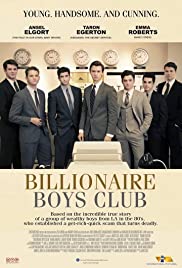
THE BILLIONAIRES BOYS CLUB
US, 2018, 108 minutes, Colour.
Ansel Elgort, Kevin Spacey, Taron Egerton, Emma Roberts, Ryan Rottman, Jeremy Irvine, Thomas Cocquerel, Bokeem Woodbine, Waleed Zuaiter, Suki Waterhouse, Judd Nelson.
Directed by James Cox.
This story of greed and wealth takes audiences back to the 1980s, the year of Wall Street, of Michael Douglas as Gordon Gecko, of his mantra that “greed is good�. This is a story of actual characters and events which illustrate this philosophy.
The setting is southern California, the characters rich young men, many belonging to wealthy families. At the centre is a young man who is a whiz at business deals, played by Ansel Elgort, looked down at school but making connections with a fellow student from the time, played by Taron Egerton (Kingsman, Elton John in Rocketman). The film shows the various steps that they take, spreading the word among friends and peers, building up finance resources, the development of a Ponzi scheme.
As with all the stories, things go very well for a time, especially with some of the business and fathers investing, even risking funds for college education of their children. But, the men are too smart for their own good, in fact, not smart enough.
The outwitting is done by an even smarter financial conman, played by Kevin Spacey, his last role before sexual misconduct allegations were made. He gives a very smooth and deceptive performance.
Eventually, desperation takes over, leading to abduction plans, leading to murder. Bokeem Woodbine appears as a bodyguard who breaks out in violence.
There is some criticism that the screenplay is far too favourable to the central character who did not deserve such sympathy.
The supporting cast is made up of aspiring young actors of the time.
This version was not well received, comparison is made with the 19’87 telemovie which starred Judd Nelson (who appears as Ansel Elgort’s father in this version).
1. The film based on actual characters and events? Previous documentary material, news treatment of the cases, dramatic miniseries? Different interpretations and perspectives?
2. Los Angeles, the 1970s and 1980s? The ethos of the times, American finance and deals? Wall Street? Financial entrepreneurs? Finance families and their heritage? The different generations, the tycoons, the next generation and their ambitions to make their mark?
3. The settings of Los Angeles, different backgrounds, the world of the wealthy, mansions, restaurants, offices? The building up of the company, lavish offices, well-appointed mansions…? The musical score?
4. The screenplay and its perspective on Joe Hunt? His character, ambitions, his background and his father, scholarship at wealthy school, his financial skills, risk taking, success, naive reading of character, consequences of investment, moral stances, collapse, violence and murder? Sympathy for him or not?
5. The screenplay and its perspective on Dean Carney, his character, background, education background, knowing Joe, seeing his success, ambitions, tempting Joe, supporting him, his colleagues and their backgrounds, taking of risks, moral perspective, leading to fraud and deception, to violence? Sympathy for him or not? Especially at the end, his confession, blaming Joe, turning state witness?
6. Joe, business a success, his relationship with his father, humble background, needing his father to save him? His flare, the discussions with the Dean, quick profit? Planning, persuasive with Dean? The decision to from the company? Dean and his outreach, the interviews, the various personalities of the friends, their family backgrounds, their social life, raucous and wealthy, girlfriends? Interest in Joe? His 50% profit? Joining, investment, meetings? The discussions with the older generation, Joe as persuasive, their investment? The investor risking his children’s college investment?
7. The character of Ron Levin, Kevin Spacey’s presence and performance? suave, self-confidence, smile and smirk, his contacts, dining with Andy Warhol, sums of money, investments, his liking Joe, the friendship, the meetings, at his house, the trick with the fake antiquity and dropping it, his principles, self-interest? His continued support, loans, investments, phone calls, setting people up? His tricking Joe, promising to reimburse, signing cheques, cheques bouncing? Joe taking Tim, masked, the setup, the threats, the gun? Tim killing Ron? Taking the body, burying him?
8. Sidney, rich background, at socials, rich and style, interest in Joe, his response to her? The various meetings, her art ambitions, her work in the Gallery, her being humiliated at the opening, Joe and his response? Meetings, discussions, the warehouse floor, the possibility for the relationship? Joe and his moods, the death of Ron, Sidney questioning, pressurising Dean for information, intending to report to the police? The dinner with her parents, their affluent background, Joe being upset, leaving?
9. The financial difficulties, the reaction of the young members of the group, pulling out?
10. Dean, continually with Joe, as best friend, ideas, pressures?
11. Izzy, the Iranian background, finance, his father, his father’s reputation in Iran, in the United States, disreputable, drugs? The plan to use him to raise the money, his being unwilling, the trunk, his collapse, transporting him, his recovery, Dean and the drugs, the fight, Dean killing him, and disposal of the body?
12. Sidney, prepared to leave, Joe and his desperation? Arrested? The interrogations, Dean and his confession?
13. The final information about Dean and Witness Protection, Joe, defending himself, trials, in prison, declaration of innocence?
Published in Movie Reviews
Published in
Movie Reviews
Saturday, 09 October 2021 13:03
White Boy Rick
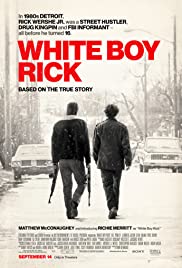
WHITE BOY RICK
US, 2018, 111 minutes, Colour.
Matthew Mc Conaughey, Richie Merritt, Bel Powley, Jennifer Jason Leigh, Brian Tyree Henry, Rory Cochrane, Bruce Dern, Piper Laurie, RJ Cyler, Jonathan Majors, Eddie Marsan.
Directed by Yann Damange.
The setting is Detroit in the 1980s, a poor neighbourhood, drug dealing and gunrunning. It is based on a true story.
The title refers to Rick Wershe and his father, also called Rick. The father, played by Matthew Mc Conaughey, deals in illicit guns, reworking them for further sales. His teenage son, Rick, helps his father and does deals in selling the guns to local African- American drug dealers. He then becomes involved in dealing himself, making contacts, shrewd in the business.
He comes to the attention of FBI agents, played by Jennifer Jason Leigh and Rory Cochrane, who put pressure on him to become an informant. This means a dangerous life, his dealings with his drug dealing friends, secret meetings - leading to violence, betrayals and deaths.
However, he is young and inexperienced in many ways, wanting to help his father, becoming further involved in the world of drugs. Which means then that he is arrested, goes to trial, has been promised some immunity by the agents who then abandon him. Ultimately, he goes to prison, serving almost 30 years before being paroled – with the information that he is the longest serving prisoner for crimes of a non-violent nature.
While still in his mid teens, he discovers that he has become a father, devoted to his daughter (whom the credits inform has married and has two children).
Richie Merritt is persuasive, especially for a nonprofessional, as Rick. There is a strong supporting cast including British Bel Powley as his drug-addicted sister, and cameos from Bruce Dern and Piper Laurie as Rick’s grandparents. The film is been directed by Yann Demmange who directed the IRA film, ‘71.
1. Based on a true story and actual characters? A glimpse of the American past, Detroit in the 1980s? Gangsters, drugs, petty criminals? The FBI?
2. Detroit, the mid-1980s, the industrial collapse, building ruins, local neighbourhoods? Homes, clubs, markets? The glamorous side of Detroit with casinos, boxing tournaments? The musical score? Authentic feel for Detroit at the time?
3. The title, Rick, aged 14 to 17, the nickname from his black friends?
4. Rick and his father, the dead mother, Dawn, the family tensions?
5. Rick and his father, buying the guns, the workshop at home, modifying the guns, the silences? Rick taking them out, the gangster contacts, bargaining with the prices? Success? His friends in the black community, the bosses, young friends, keeping company? The young woman, his surprise to find that she was pregnant and the birth of his daughter? His involvement with drugs and dealing?
6. Rick’s father, Dawn calling him a lowlife, relationship with the law, guns, modifications, sales? His exasperation with Dawn, her boyfriend, her packing up and leaving? His relationship with Rick, devotion to him, loving but stern, his relationship with the FBI agents?
7. The FBI, the three agents, working together, discussions with Rick’s father, with Rick, the pressures, persuading him to get information, his feeding it to them, as a way of saving his father?
8. The attention to detail of Rick’s life, work, contacts, the drugs? The information for the FBI?
9. His relationship with Dawn, finding the bird for her, picked up by the agents, the pressure on him?
10. Dawn, her father getting her, the experience of cold turkey and its hardships, ill, her father bringing the television, her calming down?
11. Rick, the need for money, the payments from the FBI, his father finding the money? His dealing with the drugs? Becoming involved? The police? Rick being shot by his friend, in hospital, John Doe?
12. The final deals, discussions about dealers, corrupt police, Rick getting the information? The arrests? The FBI and their promise to get him out? The trial? The jury, the guilty verdict?
13. Rick in prison, Dawn bringing his daughter, his father’s visit?
14. The final information, the long sentence, Rick in prison for 30 years while the other criminals and corrupt police were released, justice issues? The final recording of his voice, released after 30 years, and the story of his daughter and her children?
Published in Movie Reviews
Published in
Movie Reviews
Saturday, 09 October 2021 13:03
Shiva Baby
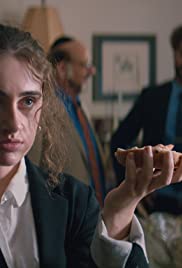
SHIVA BABY
US, 2020, 77 minutes, Colour.
Rachel Sennott, Molly Gordon, Polly Draper, Danny Deferrrari, Fred Melamed, Diana Agron, Jackie Hoffman.
Directed by Emma Seligman.
There is a nonchalant, offhand tone about the title, Shiva Baby. The setting is, in fact, Shiva rituals of celebrating the dead.
We are introduced to Danielle, played by Rachel Sennot, a precocious young woman as it turns out. She claims to be a student and we find her in a sexual relationship with one of her lecturers. But it is a relationship in which he pays her.
There are complications with her parents, their hopes for her, her wanting some independence, making her own choices, and building up her finances from her relationships. The trouble with the sexual relationship is that the lecturer is married with a young child.
While the audience might be wondering where this is all leading, their expectations are cut short when Daniela is persuaded by her parents to go to the Shiva gathering. And, who is present but the lecturer and his wife and child? What follows is a series of both comic and dramatic, with touches of the tragic, encounters, avoiding encounters, the discovery that Danielle has had a sexual relationship with a fellow student at school who is still wanting to keep up the relationship. There are many tangles, including Danielle mislaying her mobile phone, her taking some provocative photos, and their being discovered.
There is a great deal of talk, quite a range of conversations, aggressively protective mother and comic performance from Fred Melamed as the father, a range of aunts and relations and neighbours who are continually wanting to have conversations with Danielle about her future, while Danielle is busy trying to escape some attention by helping with the catering and service.
There is the drama of the fickle lecturer and his relationship with his exceedingly competent business wife and the presence of the child at the Shiva.
There is quite a comic ending, the father insisting on giving everybody a lift and Danielle and family, the lecturer, wife and child, and a neighbour all crammed into a van.
There has been some criticism of the screenplay that it presents caricatures of this kind of American Jewish community – but, others comment that, nevertheless, this is fairly real!
1. The title? Shiva? The funeral, the wake, the celebration of the dead? The gathering of friends and family? Rituals? And Danielle at the Shiva?
2. The brief running time, action over several hours, the location of Max’s office, the streets outside the Shiva, the house and its interiors, upstairs and downstairs? The musical score? Jewish music tones?
3. A portrait of Danielle, her age, memories of school, the friendship with Maya, the prom, the sexual encounter, the break with Maya? Her relationship with her parents, Joel as easy-going, optimistic? Debbie as the stereotypical Jewish mother, love, concern, fuss, intervening? Career plans, babysitting, the affair with Max and the Finance? How emotionally involved? The talk about job interviews, the talk about study? Her emotional turmoil? Her lies?
4. Danielle at the Shiva, her parents and the van, avoiding Maya, the comments about her losing weight, the issue of eating or not? Chatting with the various family friends? Discovering Max present, his wife and baby? The mounting tension, her looking at him, upstairs in the bathroom, changing her clothes, the photo and texting it? The conversations with Kim, about the baby? Awkwardness, helping with the mundane things, breaking things, the coffee spilled over her? Losing her phone, asking Maya who had looked at it? The revelation that Kim had found it? Her wanting to leave, her parents, outside with Maya, the kiss?
5. Max, married, carrying on the affair, relationship with Kim and the daughter, giving money to Danielle? At the Shiva? Tensions, his concern, communicating with Daniel, relationship with his wife? Going aside, the possibility of sex, his refusing? His reputation? Kim and her awareness of what was going on? Kim, not Jewish, entrepreneur, her companies, working from home, planning more children?
6. The sketch of Daniel’s parents, stereotypes, critical, amusing?
7. Maya, her relationship with Daniel, the past, the prom, her being frank in discussing it, following Daniel, helping her, outside, the kiss? The future?
8. The humorous finale, Maya and her fussing mother, the old lady, Max and Kim on the daughter, Joel enthusiastic and for fitting everyone in the van? The final focus on all the characters – and wondering about the future?
Published in Movie Reviews
Published in
Movie Reviews
Saturday, 09 October 2021 13:03
Fake Famous
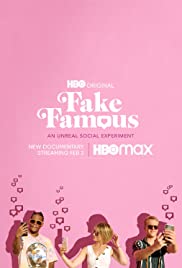
FAKE FAMOUS
US, 2021, 87 minutes, Colour.
Christopher Bailey, Dominique Druckmann, Wylie Heiner, Justine Bateman.
Directed by Nick Bilton.
Fake Famous is a topical documentary from HBO. Its focus is on fake celebrity, through social media, especially Instagram. While the topic is considered seriously, the style of communication tends to be glitzy surface, filled with Instagram images, and the touch of irony, even some mockery of those seeking this fake fame. Which limits its exploration and its depth – but serves as an alert to the wide audience (but probably not persuasive at all to the targets of its expose).
Nick Bilton, the director, had been a journalist, and is fascinated by this quest for fake fame. He decides to set up an experiment, interviewing a wide range of young people who filled in an application saying that they wanted fame. There is quite a range of interviews, introducing us, often surprisingly, to the interviewees obsessed by wanting fame. And, this, through social media, through Instagram, and the huge goal of assessing Likes, hundreds, thousands, desiring millions.
The decision was to use three of the candidates, setting them up in a quest for fame and Likes, Bilton and his team supplying fake Likes, building up the reputation of the candidates, their exposure to the wider public, their becoming Influencers, one of the goals of fame, to be regarded by their followers, to be taken up by companies as promoters of goods and products. This is a completely phony world.
Three candidates are chosen, Christopher Bailey, an African- American enthusiast who creates a business making unique designs for shirts, one-only shirts. He is also a rapper. Another candidate chosen is a young woman from Florida, moving to Los Angeles, seeking auditions as a model as an actress with some success with student filmmakers, Dominique Druckmann. The third is a young white male, almost stereotypical, also moving to Los Angeles, Wylie Hyner. A significant factor is that he is gay and proud of it, commenting upon having to leave his small hometown, but being at home in the gay culture of Los Angeles. They will want to be famous.
The central part of the film shows Nick Bilton and his team promoting the three candidates with varying degrees of success and followers.
Christopher Bailey eventually wants out, wants to be authentic, wants to be famous for himself rather than for building up fake followers and Likes. Something similar happens to Wylie Heiner, becoming more satisfied with his own life and not needing the fame, getting and ordinary job and settling down. Dominique Druckmann, on the other hand, is the success story, building up her likes, actually getting a number authentic followers rather than the set-ups from Bilton and his company. She gets auditions, sponsorships, all kinds of success and personal satisfaction. She is about to go on a paid luxury holiday in order to promote a hotel but…
The but concerns covid 19, there are sudden and immediate lockdowns, the centres of American cities deserted, the holiday cancelled.
However, the pandemic situation illustrates how followers on Instagram continue to look at the ever-increasing fake items posted, exploitation backgrounds for the seeking of fame (including the use of the mid-2020 riots in American cities, Black Lives Matter), a confirmation of the manufacturing of this world of Fake Fame.
There are some talking heads, especially actress-author, Justine Bateman, giving some background to this desire for fake fame.
Published in Movie Reviews
Published in
Movie Reviews
Saturday, 09 October 2021 13:03
Heaven/ VC Andrews Heaven

HEAVEN/ VC ANDREWS HEAVEN
US, 2019, 88 minutes, Colour.
Annalisa Basso, Chris Mc Nally, Julie Benz, James Rittinger, Jessica Clement, Chris William Martin, Matthew Nelson-Mahoood?, Todd Thomson.
Directed by Paul Shapiro.
This is the first in a series of adaptations of one of VC Andrews’ series of novels. Three were made into television films, each running 88 minutes.
Which leads to an initial difficulty, how a novel can be compressed into 88 minutes. Fans of the novels have been practically unanimous in their condemnation of the television adaptations, compressions of plot, changes in plot, and, for the diehards, lots of condemnation for the colour of the heroine’s hair! Annalise Basso plays the central role of Heaven, a teenager brought up in a hillbilly family, condemned by everyone as trash, disliked by her father, trying to take care of the rather would-be promiscuous sister, caring for the younger children, the stepmother who dies in childbirth. There is a sympathetic grandmother.
The sympathetic grandmother reveals the truth about Heaven, about her mother and her death, the grief of her father who blames Heaven for the death in childbirth. The grandmother also reveals that there is a story behind heaven’s mother, coming from a wealthy Boston family. In fact, Heaven’s return to this family is the subject of the second film in the series, Dark Angel.
The first part of this film shows Heaven at home, the death of her stepmother, the dispersing of the children to different families, including the younger sister, Fanny, to the care of the local Minister who impregnates her. Heaven herself is sent to care of a neurotic woman, Kitty, who had been in love with Heaven’s father but had lost him. Kitty is obsessive, housecleaning, domination, revealed her suffering from terminal cancer. Her husband, Cal, is trying to write a novel. He protects Heaven and begins an affair with her. In the meantime, she has been treated very well by a fellow-student, Logan, who proposes to her but she tells him the truth.
One of the difficulties with the film for those who have not read the books is that the situations, so compressed, are highly melodramatic, with some questionable credibility of characters and behaviour. Perhaps it is the dialogue, perhaps it is the performances, but they are not always convincing. This is particularly the case with Cal and his writing his novel, the seeming improbability that he would have married Kitty or she him, and the quick relationship with Heaven and the credibility of her acquiescing so quickly, betraying Logan.
And, Heaven herself seems to be the charming young innocent, the victim, but easily moving into a sexual relationship – as happens in the second film, Dark Angel.
Which means then that these films work, or do not work, at the level of soap opera.
Published in Movie Reviews
Published in
Movie Reviews
Saturday, 09 October 2021 13:03
Adieu les Cons/ Bye, Bye Morons
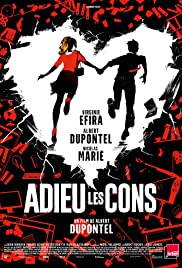
ADIEU LES CONS/BYE, BYE MORONS
France, 2020, 87 minutes, Colour.
Albert Dupontel, Virginie Elfira, Nicolas Marie, Jackie Berroyer, Philippe Urban.
Directed by Albert Dupontel.
Not a particularly flattering title! And, a touch of spoiler, the morons are generally stereotypical bureaucrats.
This film is dedicated to Monty Python collaborator, Terry Jones. Jones had appeared in two films by the director, Albert Dupontel. Dupontel acknowledges the influence of the zany Monty Python comedies. This is reinforced by the appearance of Python, Terry Gilliam, in a commercial within the film.
And, zany it is, to say the least.
In fact, it is a humorous blend of the real and the surreal, the blend of the world of ordinary people like the desperate hairdresser, Suze played by Virginia Elfira who is diagnosed with terminal illness because of the sprays that she inhaled over the years in her work in her salon, but who is determined to find the child that she gave birth to at 15 and who was immediately sent out for adoption. On the other hand, there are the characters from strange bureaucratic worlds (and a reminder that Terry Gilliasm directed the even more surreal/real world of Brazil). The chief of these characters is an IT expert played by the director himself, Albert Dupontel, Jean- Baptiste.
Jean- Baptiste is 50ish, a loner, expert, highly skilled, treated warily by authorities, let go for the up-and-coming. What is he to do – buy a gun, set it up to kill himself, the firing sending the barrel skewiff, the bullet going through an office wall and wounding one of the young experts who have been hired to take Jean-Baptiste’? place. He has to go on the run, encounters Suze, and the race is on for him to use his hacking skills to find the adopted child. Their adventures, serious, comic, slapstick, involve a blind archivist with the public records and the surgeon who assisted in the birth but who has dementia.
A lot of slapstick, bizarre, zany comedy – including the blind archivist driving the car along Paris streets, eventually with some smash and crash.
And, to bring it to a close, the secret police closing in on Jean- Baptiste, Suze watching her son and a whole romantic atmosphere as she sees his IT talent but his awkwardness and his reluctance to declare his love, except in anonymous poems, for his charming co-worker.
It is one of those expect-the-unexpected comedies, French style.
1. The title? Jean- Baptiste’s comment on his pursuers?
2. The blend of realism and surrealism? The dedicated to Terry Jones? The Monty Python tradition? Zany comedy? (And the appearance of Terry Gilliam in the commercial?) Setting the tone of the comic and the serious?
3. The French city, ordinary, streets, homes and apartments? Government offices? Technological laboratories? The musical score?
4. The intense IT world and its reach?
5. The range of eccentric characters? Surreal? Yet anchored in many realities?
6. Jean- Baptiste, his age, lonely, unmarried, at home, at work, his talents and skills, the authorities, removing him from his work? The secret police and their investigations? Jean- Baptiste reaction, the gun, the suicide attempt, failure, escaping, the encounter with Suze? The comic pratfalls and slapstick? His becoming involved in her case? Going to the archives? The blind archivist and his story? His helping, the address, the search for the house? The documents, the surgeon and his dementia, his diaries, going to visit his wife and her deciphering them? The continued pursuit, Jean- Baptiste continually working on his computer, extraordinary access? Suze finding her son, Jean Baptiste and his help?
7. Suze and her story, her age, hairdresser, going to the doctor, the diagnosis, terminally ill, the sprays at her salon and the effect on her, her life, the flashbacks to her adolescence, wild life, her look, dancing, social, the sexual encounter, her pregnancy, the reaction of her mother, the hospital and the delivery of the baby, signing the documents, its being taken from her? Facing death and her wanting to find the child? Her history of searching for the child, bureaucratic bungling and delays? The encounter with Jean- Baptiste, comic, serious, his decision to help her? The archives, the blind archivist, his finding the documents, his memories, guiding them in the car? And the later comic aspects of his driving and crashing the car? The reaction of the agents? Going to the doctor, his dementia, the diary, his wife? The first address and the wrong son? Tracking down the location of her son, his life, IT, infatuated with the co-worker, living near her, following? Suze and the appearance of her younger self? Suze and the fulfilment of her hopes?
8. The blind archivist, the comic aspects, the explanation of the accident and his blindness? His personality, eager, well-dressed, cane, helping with the search, the documents, guiding in the streets, participating in all the action, driving the car and crash?
9. The pathos of the surgeon, genial, his dementia, the interview, his diary, his wife interpreting it, the leads? His wheelchair, getting out, some kind of rehabilitation, taxi, going home to his wife?
10. The young man, adopted, IT work, genius, his infatuation, moving his apartment, the poems to the young woman?
11. The comedy of the trio watching the young man, his office, Jean- Baptiste manipulating the lights, the elevators, getting the couple together? The urging of the young man to declare his love, his reluctance, the eventual bonding?
12. French zany comedy?
Published in Movie Reviews
Published in
Movie Reviews
Saturday, 09 October 2021 13:03
Fellini of the Spirits
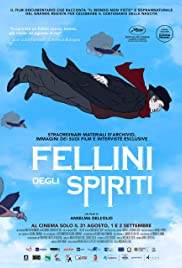
FELLINI OF THE SPIRITS
Italy, 2020, 100 minutes, colour/black and white.
Directed by Anselma Dell’ Olio.
This documentary was made as part of the celebrations of the centenary of the birth of celebrated Italian director, Federico Fellini.
This is not so much a review of the documentary but a recommendation that all Fellini fans take the opportunity to see it. And, to indicate, that for film buffs it may be quite an exhilarating way to be introduced to the work of Fellini.
The film is filled with talking heads, Italian experts, offering all kinds of interesting perspectives on the films, on Fellini himself and his wife, Giulietta Masina, on his background and interest in circus and grotesques, in more transcendental themes, the background of Italian Catholicism, his being rooted in Italian culture, various experts who intrigued him an influence his films, including Carl Jung, other psychologists and experts in paranormal phenomena.
For English-language audiences, the talking heads include directors William Friedkin, Terry Gilliam, Damien Chazelle.
The film is organising various chapters, highlighting Fellini’s background, his interests. Not all of his films are covered, depending on one’s point of view, some interesting absences, brief references to Amarcord, practically nothing on Fellini’s Roma, important as it was as a satire on things ecclesiastical. While there are some references to later films (perhaps not enough, for example Ginger and Fred), quite a lot of detailed attention is given to some of the pre-La Dolce Vita films, especially La Strada and Nights of Cabiria and, especially, Il Bidone and The White Sheik. Which means that the main attention is given to the classics of the 1960s, most especially Juliet of the Spirits and interesting comment on 8 ½. (Nothing from Satyricon, brief mention of Casanova.)
Many of the commentators indicate Fellini’s technical skills, his use of black-and-white photography, colour photography, editing and pace. There is, towards the end, a tribute to composer Nino Rota including some comments from him.
As has been said, this is a strong recommendation for a Fellini experience or an enticing introduction.
Published in Movie Reviews
Published in
Movie Reviews